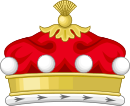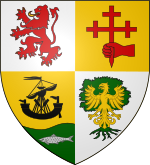Lord of Clanranald facts for kids
Quick facts for kids Lord of Clanranald |
|
|---|---|
|
Blazon: Gules two bars Or.
|
|
| Creation date | 28 September 1716 |
| Monarch | James VIII & III |
| Peerage | Peerage of Scotland (Jacobite peerage) |
| First holder | Ranald Macdonald |
| Present holder | Ranald Alexander Macdonald, 10th Lord of Clanranald |
| Heir apparent | Ranald Angus Macdonald of Clanranald, Master of Clanranald |
| Seat(s) | Castle Tioram (historically) |
| Motto | My hope is constant in thee |
The Lord of Clanranald is a special title given to the leader of the Clan Macdonald of Clanranald. This title is part of the Jacobite Peerage, which was a system of noble titles created by James Francis Edward Stuart, also known as James VIII & III. He was a claimant to the thrones of England, Scotland, and Ireland.
Contents
What is the Lord of Clanranald Title?
The title "Lord of Clanranald" refers to the Lordship of Clanranald. A lordship is like a noble rank, similar to a duke or an earl. It shows that the person holding the title is an important leader.
How the Title Was Created
The title was first created on September 28, 1716. It was given to Ranald Macdonald, who was the 15th chief of the Clan Macdonald of Clanranald.
Ranald Macdonald Becomes a Lord
When Ranald Macdonald received this title, he became a Lord and a Peer of Parliament. This meant he had a high rank in society. The title was meant to be passed down to his male heirs, meaning his sons or other male relatives.
Another Lady Clanranald
On the very same day, Ranald's sister-in-law, Penelope Louisa Mackenzie, also received a similar title. She was the widow of his brother, Allan, who was the 14th chief of Clanranald. She was created Lady Clanranald, also within the Jacobite Peerage.
Who Holds the Title Today?
As of 2009, the person who holds this title is Ranald Alexander Macdonald. He is considered the 10th Lord of Clanranald. He is also the 24th Chief and Captain of Clanranald.
Understanding "Titular"
The word "titular" means that he holds the title in name, but it might not come with the same official powers or recognition as it once did. It's more about tradition and family history now.
 | Bayard Rustin |
 | Jeannette Carter |
 | Jeremiah A. Brown |



